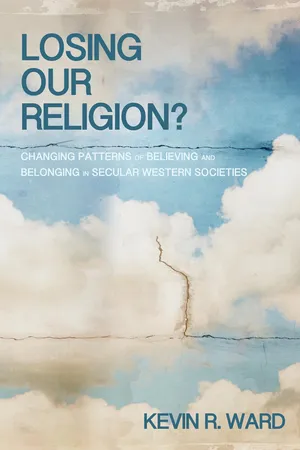
Losing Our Religion?
Changing Patterns of Believing and Belonging in Secular Western Societies
- 278 pages
- English
- ePUB (mobile friendly)
- Available on iOS & Android
About This Book
Church-going in most Western societies has declined significantly in the wake of the social and cultural changes that began in the 1960s. Does this mean that people in these societies are losing any religious dimension in their lives, or is it being expressed in other forms and places? This study begins by looking at comparative data on how church-going patterns have changed in five countries--Britain, the United States, Canada, Australia, and New Zealand--examining reasons for the decline, how churches have responded to these changes, and why some churches have shown greater resilience. It then explores some of the particular challenges these changes pose for the future of churches in these societies and some of the responses that have been made, drawing on both sociological and theological insights. The conclusion is that, despite the loss of belonging, believing persists and religion continues to play a significant role in these societies, mediated in a variety of diffuse cultural forms. Cases illustrating these changes are largely drawn from New Zealand, which as the country most recently settled by Europeans has always been secular and thus provides helpful insights.
Frequently asked questions
Information
Are We Losing Our Religion?
Table of contents
- Title Page
- Preface
- Chapter 1: Are We Losing Our Religion?
- Chapter 2: Religion in a Post-Aquarian Age
- Chapter 3: Changing Patterns of Church Life
- Chapter 4: A Terminus Quo for the Mainline?
- Chapter 5: The Charismatic Movement and the Churches
- Chapter 6: Emerging from the Shadow of Christendom
- Chapter 7: Is the Future Churchless?
- Chapter 8: Being the Church in a Fragmented World
- Chapter 9: It Might be Emerging but is it Church?
- Chapter 10: Migration and the Future of Christianity
- Chapter 11: Sport and Religion
- Chapter 12: Religion Beyond the Boundaries
- Bibliography